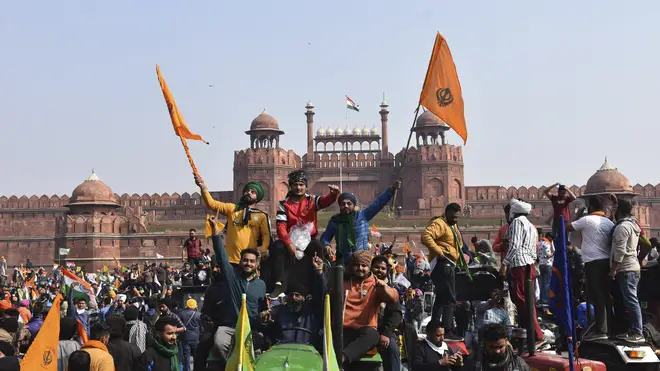
Clive Bull 1am - 4am
26 January 2021, 17:14

Police in riot gear used tear gas and water cannon to push back protesters in the Indian capital.
Tens of thousands of farmers have marched, ridden horses and driven tractors into India’s capital, breaking through police barricades to storm the historic Red Fort — a deeply symbolic act that revealed the scale of their challenge to prime minister Narendra Modi’s government.
As the country celebrated Republic Day, the long-running protest turned violent, with farmers waving union and religious flags from the ramparts of the fort, where prime ministers annually hoist the national flag on the country’s August independence holiday.
Riot police fired tear gas and water cannons and set up barricades in an attempt to prevent the protesters from reaching the centre of New Delhi, but the demonstrators broke through in many places.
People watched in shock as the takeover of the fort, which was built in the 17th century and served as the palace of Mughal emperors, was shown live on hundreds of news channels. Protesters, some carrying ceremonial swords, ropes and sticks, overwhelmed police.

The farmers have been staging largely peaceful protests for nearly two months, demanding the withdrawal of new laws they say will favour large corporate farms and devastate the earnings of smaller farmers.
The legislation has exacerbated existing resentment among farmers, who have long been seen as the heart and soul of India but often complain of being ignored by the government.
Leaders of the farmers said more than 10,000 tractors joined the protest, and thousands more people marched on foot or rode on horseback while shouting slogans against Mr Modi. At some places, they were showered with flower petals by residents who recorded the unprecedented protest on their phones.
Authorities used tear gas, water cannons and placed large trucks and buses in roads to try to hold back the crowd, including rows of tractors which shoved aside concrete and steel barricades.
Police said one protester died after his tractor overturned, but farmers said he was shot. Several bloodied protesters could be seen in television footage.

Farmers — many of them Sikhs from Punjab and Haryana states — tried to march into New Delhi in November but were stopped by police. Since then, unfazed by the winter cold and frequent rains, they have hunkered down at the edge of the city and threatened to besiege it if the farm laws are not repealed.
The government insists that the agriculture reform laws passed in September will benefit farmers and boost production through private investment, but the farmers fear it will leave those with small plots behind as big corporations win out.
The government has offered to amend the laws and suspend their implementation for 18 months, but farmers insist they will settle for nothing less than a complete repeal and plan to march on foot to parliament on February 1.
Since returning to power for a second term, Mr Modi’s government has been rocked by several convulsions. The economy has sunk, social strife has widened, protests have erupted against laws some deem discriminatory and his government has been questioned over its response to the coronavirus pandemic.

In 2019, the year that witnessed the first major protests against his administration, a diverse coalition of groups rallied against a contentious new citizenship law they said discriminated against Muslims.
But the latest protests — which began in northern states that are major agricultural producers — have triggered a growing rebellion that is fast spreading to other parts of the country, presenting a serious challenge to Mr Modi’s government.
Agriculture supports more than half of the country’s 1.4 billion people, but the economic clout of farmers has diminished over the last three decades. Once producing a third of India’s gross domestic product, farmers now account for only 15% of the country’s economy.